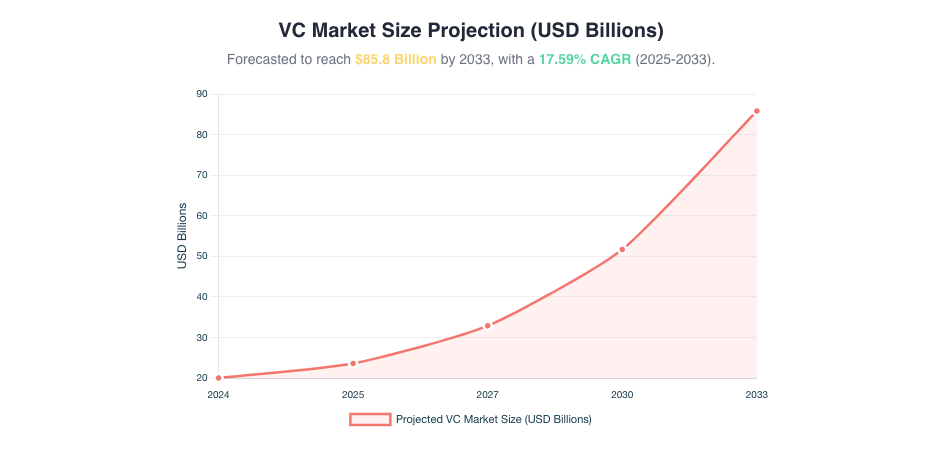Early-Stage Startup Funding Japan: Guide to Angels, Seed & Incubators
Explore startup funding Japan. Your 2025 guide to Japanese angel investors, seed investment Japan, & and incubators for foreign founders.

Perceived as a challenging market, Japan is now rapidly transforming into a startup beacon for global entrepreneurs. With its venture capital market hitting $20.0 Billion in 2024 and a projection of $85.8 Billion by 2033, the question isn't if you should consider Japan, but how to navigate its unique funding landscape. For foreign founders with innovative ideas, this signals a veritable "gold rush" – a chance to tap into a dynamic market hungry for fresh solutions.
But why focus on Japan for your early-stage venture? Beyond the impressive market growth, Japan offers a large, sophisticated domestic market with high technology adoption, specific government backing for innovative tech solutions, and an early-stage environment that, while competitive, can be less saturated than some Western hubs. This presents a unique opportunity for foreign founders to become key players in emerging niches and tap into a market hungry for fresh, high-quality solutions.
But like any frontier, navigating Japan's early-stage funding landscape requires a map. If you're a foreign startup looking to secure startup funding in Japan, particularly at the angel or seed stage, or wondering about the role of incubators, this 2025 guide is for you.

The Early-Stage Scene: A New Dawn for Early Stage Funding Japan
Japan's commitment to fostering innovation is stronger than ever. The government's "Startup Development Five-year Plan" aims to dramatically increase the number of startups and boost investment, creating a more fertile ground for early stage funding in Japan. While the ecosystem has its unique characteristics, the foundational elements of angel investment, seed rounds, and accelerator support are becoming increasingly robust and accessible to international entrepreneurs.
Japanese Angel Investors: Your First Believers in the Market
For many startups, angel investors are the first crucial believers who provide not just capital but often invaluable mentorship and network access. In Japan, the angel investment scene, while historically less developed than in places like Silicon Valley, is growing.
- The Role of Japanese Angel Investors: They are typically high-net-worth individuals, often experienced entrepreneurs or executives, looking to back promising early-stage ventures. They play a vital role in bridging the gap before institutional seed funding becomes viable.
- JAIA (Japan Angel Investors Association): Organizations like JAIA are working to cultivate a more active and supportive angel investment culture in Japan.
- The "Angel Zeisei" Tax Incentive: Japan's "Angel Zeisei" system offers attractive tax benefits to individual Japanese investors backing eligible startups. This is a significant driver for angel activity. However, for foreign-founded startups operating in Japan, it's crucial to verify the specific conditions under which these incentives apply to investments in your entity. The structure of your Japanese presence (e.g., KK vs. branch) and other factors can influence this. Consulting with local tax and legal experts early on is highly recommended to understand how this impacts your attractiveness to Japanese angel investors and to navigate any potential complexities when you're figuring out how to find angel investors in Japan.
Securing investment from Japanese angel investors often hinges on building trust and demonstrating a deep understanding of the local market, alongside a compelling business proposition. Finding these angels often means tapping into Japan's network-driven environment. Cold outreach is generally less effective. Instead, focus on:
- Warm Introductions: These are paramount. Leverage any existing contacts, advisors, or connections from your home country who might have links to Japan.
- Accelerator & Incubator Networks: Programs listed later often have strong connections to local angel groups and individual investors.
- Industry-Specific Events: Attend conferences, seminars, and meetups (even virtual ones initially) relevant to your sector in Japan. These are good opportunities for organic networking.
- JETRO and Chambers of Commerce: These organizations can sometimes facilitate introductions or point you to relevant networks.
- Specialized Consultants/Advisors: Consider engaging with professionals who specialize in connecting foreign startups with Japanese investors, though vet them carefully. We at Omnilinks can help by introducing you to our network.
Building genuine relationships, even before a formal pitch, is key to navigating this landscape.
Seed Investment Japan: Planting the Seeds for Growth
Once you have initial validation, or if your venture requires more substantial early capital, seed investment in Japan comes into play. This stage is critical for product development, team expansion, and initial market entry.
- Typical Funding Amounts: Seed rounds in Japan can vary significantly based on sector, team experience, and traction, but deal sizes typically fall within the ¥50 million to ¥500 million (approximately $340,000 to $3.4 million USD) range. For many foreign startups, particularly in tech, aiming for the lower to mid-end of this range for an initial Japanese seed round is a realistic starting point, with ambitions to scale towards the higher end as they demonstrate strong product-market fit within Japan. While larger seed rounds occur, these figures represent a common ballpark. The median deal size for seed funding has remained relatively stable, indicating a consistent appetite for promising early ventures.
- Valuation Expectations: Generally, early-stage valuations in Japan might be more conservative compared to the US. This reflects a market that often prioritizes sustainable growth and strong fundamentals.
- Focus: Investors at this stage will scrutinize your team, product-market fit (even if nascent), scalability, and your strategy for navigating the Japanese market. Success in securing seed funding is also deeply intertwined with the network-driven nature of the ecosystem. Investors often rely on trusted sources for deal flow. This means that your efforts in building relationships, perhaps through an accelerator or initial angel connections, become even more critical as you approach seed-stage VCs or more formal investment groups.

Understanding J-KISS: A Key Instrument for J-KISS Funding Japan
When discussing early stage funding Japan, particularly for seed rounds, you'll likely encounter the J-KISS.
- What is J-KISS? It's the Japanese adaptation of the "Keep It Simple Security" (KISS), a convertible instrument designed for speed and simplicity in early-stage financing. Legally, it's structured as a type of "stock acquisition right" under Japanese law.
- Key Terms: Like other convertible notes, J-KISS agreements typically include a Valuation Cap (the maximum valuation at which the investment converts to equity) and a Discount Rate (a discount on the share price of a future priced round).
- Advantages: The primary benefit of J-KISS funding in Japan is its ability to help startups secure capital quickly without the complexities of a priced equity round at a very early stage when valuation is challenging to determine.
- FDI Implications: It's important for foreign founders to be aware of Japan's Foreign Exchange and Foreign Trade Act (FEFTA). If a foreign investor (an individual or entity defined as foreign under FEFTA) holds a J-KISS, the subsequent conversion of that J-KISS into shares in your Japanese company would be considered an acquisition of shares by a foreign investor and thus subject to FEFTA regulations. This might require notifications depending on the industry and other factors. Legal counsel is crucial to navigate these rules.
Incubators & Accelerators: Your Launchpad in Japan (Including Japan Startup Incubators for Foreigners & Tokyo Startup Accelerators)
For foreign startups, Japan startup incubators for foreigners and Tokyo startup accelerators can be invaluable launchpads, offering much more than just office space.
- Why They Matter: These programs provide critical mentorship, access to local networks (investors, corporates, talent), potential seed funding, and often, crucial support for navigating the practicalities of setting up in Japan, including visa assistance. They are often one of the most effective ways for foreign founders to break into the local network and gain the credibility needed to attract early-stage investors.
- Notable Programs with an International Focus:
- X-Hub Tokyo: Initiated by the Tokyo Metropolitan Government, it actively supports both Japanese startups going global and international businesses entering Japan.
- Alchemist Japan: Part of the renowned US-based Alchemist Accelerator, it focuses on B2B enterprise tech startups with global potential and offers a pathway to its San Francisco program. They may offer investment up to $100k.
- JETRO-Facilitated Programs: The Japan External Trade Organization (JETRO) often collaborates with global accelerators, providing pathways for startups.
- Plug and Play Japan: With its global network, it connects startups to corporate partners and investors across various industries.
- SAP.iO Foundry Tokyo: Focuses on early-stage B2B enterprise software startups, offering integration opportunities with SAP's ecosystem without taking equity.
- 01Booster: Known for its focus on corporate partnerships, potentially offering funding up to ¥10 million.
Choosing the Right Program: When evaluating Japanese incubators and accelerators, it's vital for international founders to look beyond generic offerings. Prioritize programs that explicitly demonstrate:
- A Proven Track Record: Evidence of successfully supporting other international (non-Japanese) startups in the Japanese market.
- Bilingual Mentorship & Support: Access to mentors and program staff who can communicate effectively in English (or your primary language) and understand the unique challenges faced by foreign entrepreneurs.
- Relevant Networks: Connections to investors, corporate partners, and talent pools that are genuinely accessible and valuable for a foreign startup trying to gain traction in Japan.
- Practical Market Entry Support: Assistance with legal setup, visa navigation (beyond just pointing to resources), and understanding local business practices.Simply having an 'international' label isn't enough; dig deeper into how they cater specifically to your needs as a foreign entrant.

Navigating the Nuances: Early Tips for Success
Even at the earliest stages, remember:
- Cultural Understanding is Key: Begin learning about Japanese business etiquette and communication styles.
- Local Partnerships Matter: Even informal connections can open doors.
- Leverage Support: Organizations like JETRO offer extensive free services for foreign companies.
The Gold Rush is Real – If You're Prepared
Japan's early-stage funding scene is vibrant and full of opportunity for foreign startups. From understanding the role of Japanese angel investors and navigating seed investment Japan with instruments like the J-KISS, to leveraging Japan startup incubators for foreigners, the path is becoming clearer.
While challenges exist, the commitment from the government and the growing interest from both domestic and international investors make this an exciting time. The "gold rush" is indeed real for those who come prepared with a strong value proposition, a willingness to adapt, and a commitment to building relationships in this dynamic market.
Want the complete picture? Download the Full Deep Research Report on Japan's Startup Ecosystem today!
More stories of success
Explore how Omnilinks has helped other businesses achieve their goals through innovative strategies and impactful solutions.
Ready to expand your business in Japan?
Connect with our expert team today and learn how we can transform your market challenges into opportunities for success.
Stay ahead in the Japanese market
Receive the latest insights, case studies, trends, and strategies directly in your inbox.




